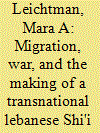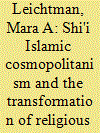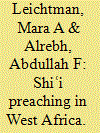| Srl | Item |
| 1 |
ID:
095115


|
|
|
|
|
| Publication |
2010.
|
| Summary/Abstract |
The July 2006 Lebanon war was an important turning point for West African Lebanese. For the first time since their formation as a community, the Lebanese in Senegal organized a demonstration in Dakar displaying solidarity with Lebanon. This protest illuminates the dynamics between global forces and local responses. Hizbullah's effectiveness in winning the international public opinion of both Sunni and Shi?i Muslims in the war against Israel led to a surge in Lebanese diaspora identification, even among communities who had not been similarly affected by previous Lebanese wars. By analyzing the role of a Lebanese shaykh in bringing religious rituals and a Lebanese national identity to the community in Senegal, this article explores how members of the community maintain political ties to Lebanon even when they have never visited the "homeland" and sheds new light on the relationship among religion, migration, and (trans)nationalism.
|
|
|
|
|
|
|
|
|
|
|
|
|
|
|
|
| 2 |
ID:
134222


|
|
|
|
|
| Publication |
2014.
|
| Summary/Abstract |
Senegalese "conversion" to Shi'i Islam resulted from cosmopolitan interactions with West Africa's resident Lebanese population and Iranian revolutionary ideologies. Shi'i advocates spread their religious convictions through teaching, conferences, holiday celebrations, and media publicity. Key to their success are libraries full of Arabic and French texts from Iran and Lebanon. Inherent in Islamic education is the authority bestowed on those who are knowledgeable, and with the spread of religious knowledge through books, media, and the Internet comes a broadening of the scope of religious authority and resulting conflict with or accommodation of old political communities. Senegalese converts to Shi'i Islam use their literacy in Arabic and individually acquired libraries of Islamic legal books to bypass the authority of Sufi marabouts. Some keep their feet in both Sunni and Shi'i worlds, and their ability to compare religious texts of both traditions wins them disciples. Shi'i minorities claim autochthony and authenticity in Senegal through narrating revisionist historical accounts of the spread of (Shi'i) Islam to Africa. Conferences commemorating the martyrdom of Imam Husayn during the Shi'i mourning period in the month of Muharram target Sufi Muslims who also love the family of the Prophet. Shi'i leaders skillfully detach this foreign religious ideology from Middle Eastern politics and make this branch of Islam relevant to Senegalese through establishing religious centers as NGOs, which work to bring health care and economic development to neighborhoods in the name of Shi'i Islam.
|
|
|
|
|
|
|
|
|
|
|
|
|
|
|
|
| 3 |
ID:
159820


|
|
|
|
|
| Summary/Abstract |
While there has been much emphasis on new types of media for the dissemination of Islamic ideas, this article focuses on the conventional Friday khuṭba. Lebanese Shaykh al-Zayn was trained in Najaf, Iraq and was sent by Musa al-Sadr to serve the Lebanese diasporic business community in Senegal. Estranged from the religious politics of the homeland and traditional centres of Shiʿi learning, Lebanese in Senegal depended on Shaykh al-Zayn to teach them about Shiʿi Islam. The Islamic Social Institute he built was the first Shiʿi institution in all of West Africa. Shaykh al-Zayn quickly gained a following of both Sunni and Shiʿi Muslims, Arabs as well as Africans. This article focuses on the shaykh’s discursive strategies for addressing his unique following. At times his Friday sermons stressed the particularities of Shiʿi Islamic practice, but more often he highlighted a universal Islam in an effort to appeal to Senegal’s Sunni Muslim majority. In analysing khutbas given in 2003 during the beginning of the U.S.-led war in Iraq, we pay particular attention to the Lebanese shaykh’s engagement with global politics and how his messages were translated for a community in West Africa detached from the Middle East.
|
|
|
|
|
|
|
|
|
|
|
|
|
|
|
|